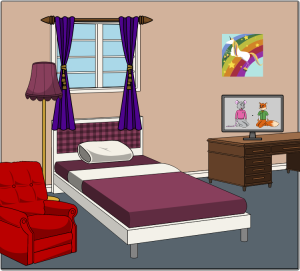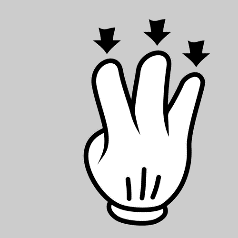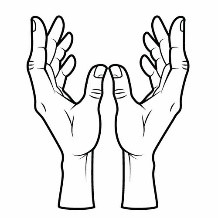4 Section 4-4: The Dative Case–Personal Pronouns
4.4: The Dative Case—Personal Pronouns
In Chapter 1, you learned about the nominative case. In Chapter 2, you learned about the accusative case. Here is a brief summary.
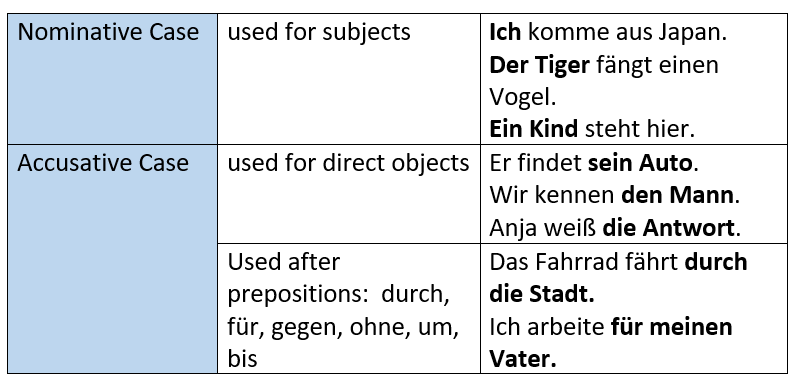
In this chapter, you will learn the dative case—der Dativ.
The dative case is used for indirect objects. An indirect object is the person or thing to whom or for whom something is done/given/shown/bought, etc.
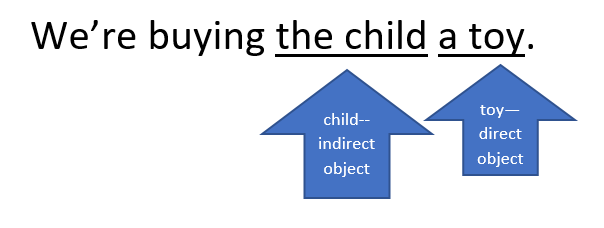
In the example above, the direct object (aka the accusative case), is the toy. We’re buying the toy, NOT the child! Don’t buy people!
The child is the indirect object, aka the person we gave the toy TO. “To” is the key word here. Whomever you buy or give something TO is the indirect object.
Click here to see me explaining what an indirect object is in English with examples.
In English, as also in German, the word order for indirect and direct objects tends to be as follows.
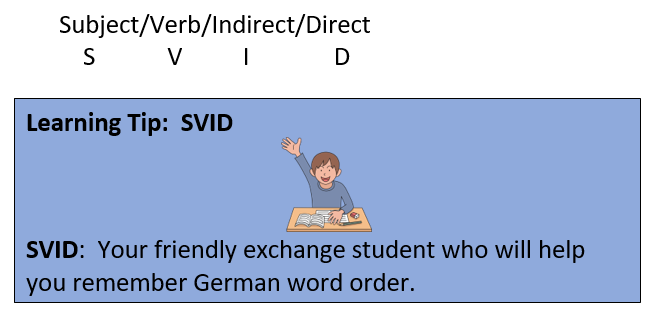
We will begin with the dative case personal pronouns.
In chapters 1 and 2, you learned the following personal pronouns:
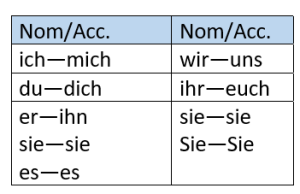
We used the nominative to replace nouns in the accusative case.
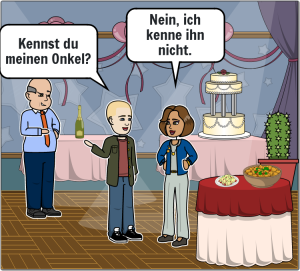
Beispiel:
–Kennst du meinen Bruder?
–Ja, ich kenne ihn.
Dative Case Pronouns:

If we substitute these in for our indirect objects, it will look like this.

Wir kaufen Anne ein Stück Kuchen.
Wir kaufen ihr ein Stück Kuchen.
S V I D
(We’re buying [for] her a piece of cake.)

Der Verkäufer zeigt Udo einen BMW.
Der Verkäufer zeigt ihm einen BMW.
S V I D
(The salesman is showing [to] him a BMW.)

Die Hexe gibt Hänsel und Gretel Schokolade.
Die Hexe gibt ihnen Schokolade.
S V I D
(The witch is giving [to] them chocolate.)
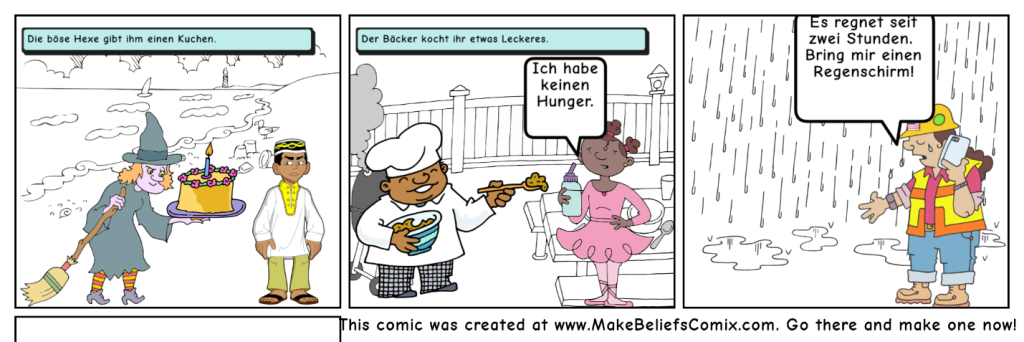
Watch me reteaching this.
Ex. A: Pronomen. Match each German dative case pronoun with its English equivalent.
Ex. C: Was schenken Sie wem? To whom are you giving what?
- Was schenken Sie Ihrer Mutter zum Geburtstag?
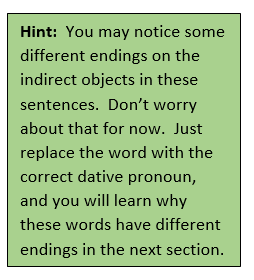
- Was schenken Sie Ihrem Vater zum Geburtstag?
- Was kaufen Sie Ihrer Schwester in Europa?
- Was kaufen Sie Ihrem Bruder in Deutschland?
- Was geben Sie Ihrer Tante zu Weihnachten?
- Was geben Sie Ihrem Onkel zu Weihnachten?
- Was schenken Sie Ihrem Hund/Ihrer Katze?
EXTRA PRACTICE: (Courtesy of Claudia Kost & Crystal Sawatzky, University of Alberta).
Using Dative Pronouns: How to Say What Hurts
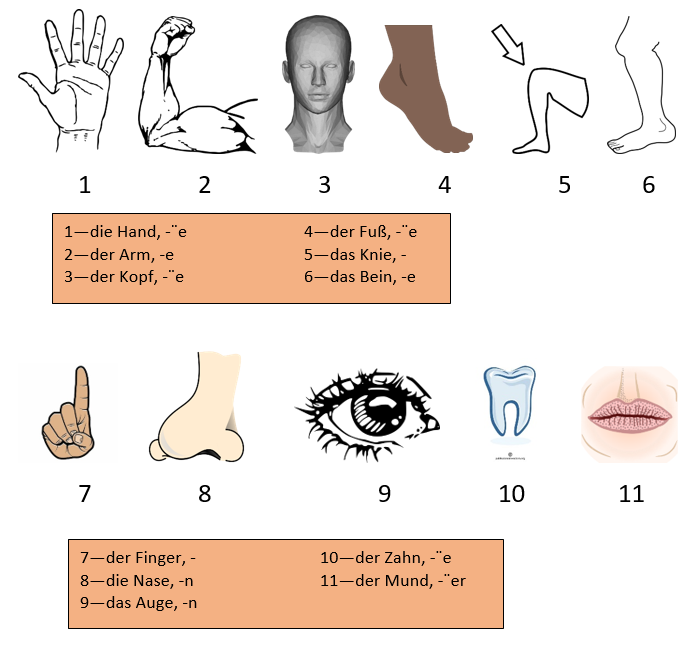
Listen to the body parts being pronounced here. (Courtesy of Claudia Kost & Crystal Sawatzky, University of Alberta.)
To say that a part of your body hurts, use dative pronouns.
Mir tut das Bein weh. OR Das Bein tut mir weh.
In English, this would translate to, “My leg hurts.” In German, we use dative pronouns to show that the pain is happening to us. The above example translates literally to
To me hurts the leg.
To use this construction in German, you will need the verb tun, which means “to do.” Since the leg is the thing doing the action, we will conjugate tun for er/sie/es.
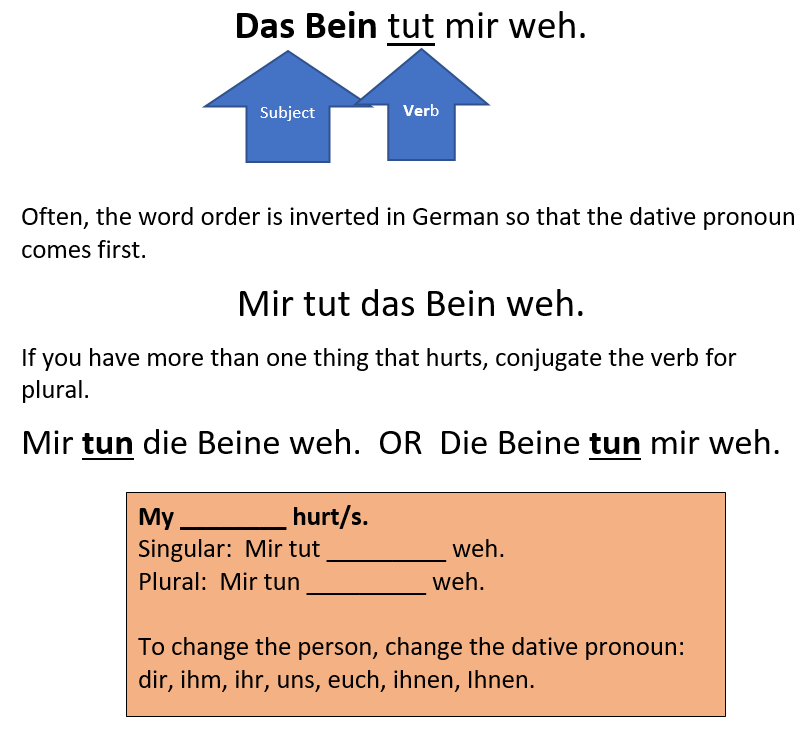


Watch the video to see lots of examples with body parts in real life:
Ex. D: Was tut Ihnen weh? With a partner, discuss how you’re feeling. Watch out for singular and plural words!
Beispiel: 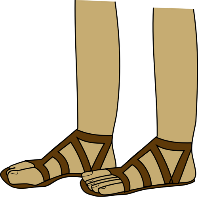
A: Tun dir die Beine weh?
B: Ja, mir tun die Beine weh.
ODER
B: Nein, mir tun die Beine nicht weh.
Ex. E: Ihm tut der Fuß weh. Beschreiben Sie jedes Bild.
Beispiel: 
→Ihm tut der Arm weh.
 2.
2.  3.
3.  4.
4. 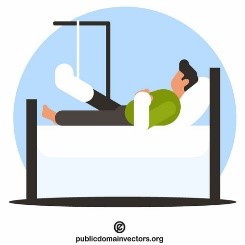
Ex. F: LISTENING COMPREHENSION: Listen to the description of Anna and answer the questions. You will hear several colors, adjectives, and body parts. (Audio used with permission from Germanlistening.com.)
EXTRA PRACTICE: Go to Germanzone.org’s website to practice using vocabulary for body parts. There may be some new words, but a dictionary can help.
- https://www.germanzone.org/korperteile1-womit-macht-man-das/
- https://www.germanzone.org/korperteile-2-womit-macht-man-das/


Ex. G: Rollenspiel. You are at a Flohmarkt in Germany and want to know more about certain items. One student plays the roll of the seller, the other the roll of the customer. Use the pictures below as the items in the Flohmarkt.

- Kunde/Kundin: Ask to be shown certain items. “Zeigen Sie mir ________, bitte.“
- Verkäufer/Verkäuferin: Show the items and answer any questions about them.
- Be creative! Ask as many questions as possible. Then swap roles.
Beispiel: 
Kunde: Guten Tag! Zeigen Sie mir die Uhr, bitte.
Verkäufer: Bitte schön! Sie kostet zehn Euro.
Kunde: Wie alt ist die Uhr?/Woher kommt die Uhr?/Ist die Uhr kaputt?/Nehmen Sie 8 Euro für die Uhr?…usw

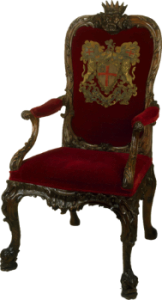


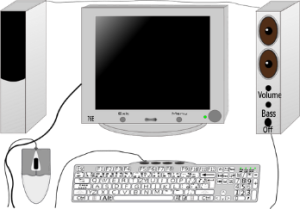


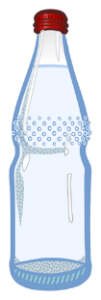
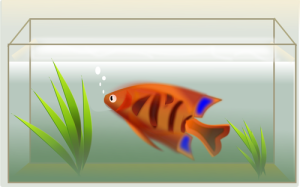

Here are a few more items you might ask about at a Flohmarkt. (Courtesy of Claudia Kost and Crystal Sawotzky, University of Alberta.) Look over them and then do the next activities to review the accusative case. We’ll be learning the dative case endings in the next chapter, so it’s important to have an excellent grasp of the accusative case now.
EXTRA PRACTICE: Go to Germanzone.org’s website to practice dative pronouns.
- https://www.germanzone.org/dative-case-personal-pronouns-1/
- https://www.germanzone.org/dative-case-personal-pronouns-2/
- https://www.germanzone.org/dative-case-personal-pronouns-3/

Ex. H: Listening Practice. Listen to the description of the library (die Bücherei/die Bibliothek) and answer the questions about it. You will hear several dative case pronouns (ihm = to him). Audio used with permission from germanlistening.com.
Ex. I: Nicos Weg. Episode 32: Emmas Wochenende. Watch episode 32 and do the online activities. Once again, you will hear several separable prefix verbs. You will also review the stem-changing verbs fahren, schlafen, and waschen.
https://learngerman.dw.com/en/emmas-wochenende/l-37452629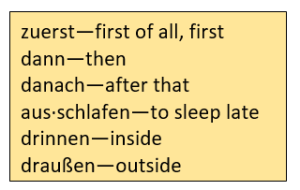
Ex. J: Nicos Weg. Episode 33: Wie spät ist es? Watch episode 33 and do the online activities. You will review telling time, which you learned in previous chapters.
https://learngerman.dw.com/en/wie-sp%C3%A4t-ist-es/l-37453621
Ex. K: Wiederholung. Was gibt es in diesem Zimmer? Was gibt es nicht? (Use the furniture vocabulary words that you learned at the end of Section 4-1.)
